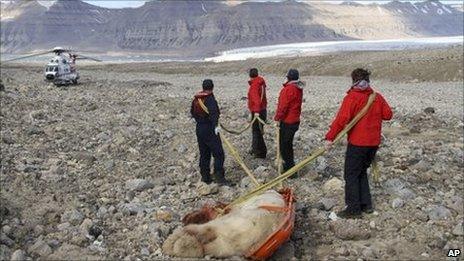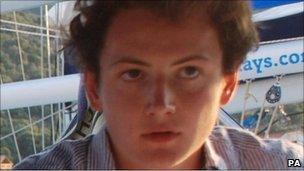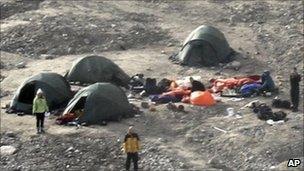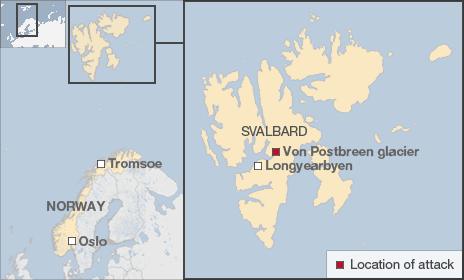Polar bear kills British boy in Arctic
- Published

Rescuers took the polar bear away from the site after it was shot dead by a team member
A polar bear has mauled a 17-year-old British boy to death in the Arctic and injured four other UK tourists.
Horatio Chapple, from Wiltshire, was with 12 others on a British Schools Exploring Society trip near a glacier on the Norwegian island of Spitsbergen.
The four who were hurt - two severely - included two leaders of the trip. They have been flown to Tromsoe where their condition is stable.
BSES chairman Edward Watson described Mr Chapple as a "fine young man".
Mr Watson said the society had been in touch with his family - who live near Salisbury - and had offered "our utmost sympathy".

Horatio Chapple was expected to read medicine after completing his studies at Eton
He said: "Horatio was a fine young man, hoping to go on to read medicine after school. By all accounts he would've made an excellent doctor."
He said the society's executive director was travelling to Spitsbergen, in the Svalbard archipelago, adding: "We are continuing to gather information on this tragedy."
Mr Chapple was studying at Eton College in Berkshire. Geoff Riley, head of teaching and learning technologies at the school paid tribute on Twitter, saying his thoughts and prayers were with his family.
Helicopter scrambled
The attack, near the Von Post glacier about 25 miles (40km) from Longyearbyen, took place early on Friday.
The group contacted the authorities using a satellite phone and a helicopter was sent to rescue them.
The bear was shot dead by a member of the group.
The BSES, a youth development charity, said the injured men were trip leaders Michael Reid, 29, and Andrew Ruck, 27, who is from Brighton but lives in Edinburgh, and trip members Patrick Flinders, 17, from Jersey, and Scott Smith, 16.

The Svalbard expedition began on 23 July and was scheduled to run for five weeks
The injured were flown to hospital in Longyearbyen and then on to University Hospital in Tromsoe, on the Norwegian mainland.
A spokeswoman for the hospital said the patients were now in a stable condition.
The father of Patrick Flinders, Terry, said he believed the polar bear had crossed a trip wire and into his son's tent.
"According to the doctor and the other people Patrick was trying to fend off the polar bear by hitting it on the nose - why, I don't know, but he did and... the polar bear attacked him with his right paw across his face and his head and his arm," he said.
Extremely dangerous
Those worried about their relatives should call 0047 7902 4305 or 0047 7902 4302.
The UK ambassador to Norway, Jane Owen, is leading a consular team to Tromsoe to provide assistance to the expedition group.
She said the event was "really shocking and horrific".
"I cannot begin to imagine what a dreadful ordeal it is for everyone involved and of course especially the families.
"And our thoughts and prayers go out, particularly to the parents of and the family of Horatio but also everyone who's been affected by this."
Lars Erik Alfheim, vice-governor of Svalbard, said polar bears were common in the area.
"These days when the ice comes in and out like it does right now, it's not unlikely to encounter polar bears. Polar bears are extremely dangerous and it's an animal that can attack without any notice."
The BSES group of 80 people were on a trip which began on 23 July and was scheduled to run until 28 August.
A blog on the group's website dated 27 July described polar bear sightings from their camp where they had been marooned due to "an unprecedented amount of ice in the fjord".
"Despite this everyone was in good spirits because we encountered a polar bear floating on the ice, this time we were lucky enough to borrow a kind Norwegian guide's telescope to see it properly," it said.
"After that experience I can say for sure that everyone dreamt of polar bears that night."
Earlier this year the governor's office warned people about bear attacks after several were spotted near Longyearbyen.
BSES Expeditions, based in Kensington, west London, organises scientific expeditions to remote areas to develop teamwork and a spirit of adventure.
It was founded in 1932 by a member of Captain Scott's final Antarctic expedition of 1910-13.
Polar bears are one of the largest land carnivores, reaching up to 8ft (2.5m) and weighing 800kg (125st).
